Professional and Unpaid Carers Defined?
From the outset, is is important to understand there are notable distinctions defining and differencing professional and unpaid carers.
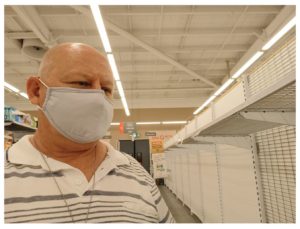
A ‘professional carer’ (more commonly known as a ‘care worker’ or ‘paid support worker’) is usually engaged by a care support organisation, is trained, qualified and paid to look after people on an employed basis.
An ‘unpaid carer’ (more commonly referred to as just a ‘carer’) might be a spouse, partner, parent, child, sibling, family member, friend, or neighbour who regularly looks after the needs of an aged, infirm, disabled, or incapacited person on a permanent or temporary basis in return for a government benefit.
Carer Versus Caregiver?
There seems to be a prevalent and public misconception about the appellation carer which is often misused as a broad, or umbrella term for professional and unpaid carers alike.
The fundamental distinction between paid and unpaid carers is now blurred and seems irrelevant.
So until the clear delineation between paid and unpaid carers is restored, the selfless efforts and personal sacrifices of unpaid carers cannot be properly recognised, and their financial needs sufficiently addressed.
Potentially the most ideal solution to the conundrum is to delineate professional carers as paid support workers and unpaid family and community caregivers as carers?
Food for thought.
Carers are Exploited!
So sweatshops are illegal, slave labour is a crime; yet some carers receive as little as 41 cents an hour to look after an aged, infirm, disabled, or incapacitated person 24/7/365! We need to stop the exploitation of carers …. now!

The federal government cannot continue to ignore the thoughts, views and everyday realities faced by carers and their families; the exploitation must stop – NOW!
Together, we can, and should put more pressure on the government to do the right thing by carers who are being exploited by an unfair, unjust, and reprehensible benefit system.
Seven Policy Priorities for Change!
Carers Have Seven Policy Priorities for the federal government!
1. Without further excuse and delay, the federal government must commit to immediately implementing the principles of the Statement for Australia’s Carers as set forth under the provisions of the Carer Recognition Act 2010 (No. 123, 2010).
2. Increase the Carer’s Allowance to at least $493.80 per fortnight; this being fifty-percent of the current March 2022 Carer Payment/Pension Rate of $987.60. This should be payable in addition to any Centrelink Primary Income Support Payment.
3. Remove the income tests that apply to Carer’s Allowance and Carer’s Payment.
4. Pay the current Superannuation Guarantee (SG) contribution on behalf of the carer who should be able to access it (tax and income-test free) upon ceasing to be a primary carer.
5. Prohibit any fully or partially funded government aged care and/or disability service provider, grant recipient, or contractor from levying and/or charging gap fees or co-payments.
6. Facilitate a public education campaign to restore and reinforce the fundamental distinctions between paid support workers and carers.
7. Establish regional service hubs where information is acquired, distributed, disseminated and free-flowing directly between carers and the government.
Unpaid Carers: A Workforce Unrecognised, Undervalued and Underpaid!
Successive federal governments have spruiked that older Australians should be encouraged to live longer at home before moving into nursing homes; easier said than done when carers are not being duly recognised for their efforts and the burden saddled upon them – with some carers receiving as little as 41 cents an hour to look after an aged, infirm, disabled, or incapacitated person 24/7/365.
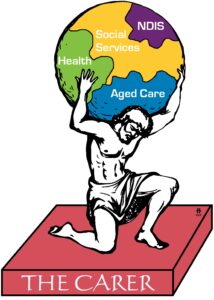
On Wednesday 15 June 2022, it was announced by the Australian Fair Work Commission “the minimum wage will be lifted $1.05 an hour from its $20.33 base from 1 July 2022, an increase of 5.2 per cent, to $21.38 an hour;” that’s $812.44 for a 38 hour week, $1624.88 a fortnight!
For working 168 hours a week, those receiving Carer’s Allowance now only get 8.40% of the National Minimum Wage – down from the 2021 rate of 8.83% – for working 24 hours a day, 7 days a week, and 365 days of the year.
Now we’re told “all employees working in Australia are entitled to a minimum wage. This is the minimum amount an employee can be paid for the work that they’re doing;” but alas carers are not considered employees but Australian government benefit recipients.
This is disgraceful, inexcusable and an affront to carers and their families!
According to the Australian Bureau of Statistics Disability, Ageing and Carers, Australia: Summary of Findings (ABS, 2018) there are 2.65 (2,650,000) million unpaid carers in Australia providing care and support to a family member or friend; 37.4% of carers themselves have a disability; there are 235,300 young carers aged under 25 and there are 533,400 carers in Queensland alone.
It is estimated that those caring for family members actually save the government – the Australian taxpayer, the community, you – more than $77.9 (77,900,000,000) billion a year providing informal/primary care across Australia.
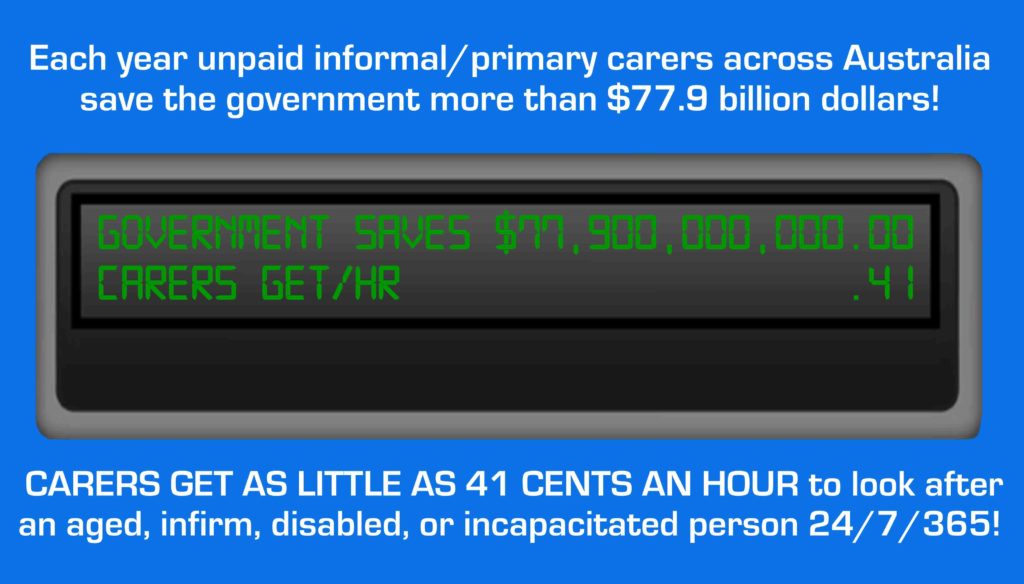
Now, crunching the numbers, if there are 2,650,000 unpaid carers in Australia saving the government a whopping 77,900,000,000 billion dollars, the reality is each carer is worth, at the least $29,396.23.
Carers don’t just sacrifice their time or money.
Carers often have to give up fulltime work, they put their lives on hold, they often become socially isolated, they are in poor physical health, they ignore their own social, personal, mental, emotional and spiritual well-being and are not adequately supported by the government or service providers, let alone by members of their own family.
For many carers, thoughts of financial ruin, destitution and homelessness are very real!
More often than not long-standing and cohesive family relationships will become strained and families fracture.
The increasing plight and suicide rates of distressed and desperate carers is continually ignored.
Caring for a loved one isn’t just a labour of love, it is a burden in countless ways that many could never appreciate or imagine, lest of all our financially over-endowed politicians and our out-of-touch federal government which offers carers a paltry Carer’s Payment of $987.60 per fortnight: that’s just $493.80 a week, $70.54 per day, or just $2.94 an hour to look after an aged, infirm, disabled, or incapacitated person 24/7/365; provided of course the carer is prepared to give up work and sacrifice a generous income, benefits and superannuation.
Persons already in receipt of a government pension/benefit cannot receive a Carer’s Payment in addition to their pension/benefit, but may qualify for a Carer’s Allowance of $136.50 a fortnight, $68.25 a week, $9.75 a day, or just 41 cents an hour to look after someone 24/7/365.
The Carer’s Allowance of $136.50 a fortnight, or $3549 per year is reprehensible to say the least; it is not even enough to cover the basic costs of keeping a vehicle on the road.
It’s time the federal government rightly recognised Australia’s 2.65 million unpaid carers and the need for immediate, realistic and proper financial recognition.
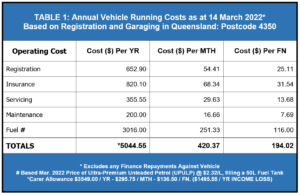
In this case in point, the cost to keep my car on the road totals $5044.55 a year, $420.37 a month, or $194.02 a fortnight; quite disproportional to the Carer’s Allowance of $3549.00 a year – leaving me out-of-pocket $1495.55.
Carer’s Payment Versus Carer’s Allowance?
Firstly, Carer’s Pension no longer exists – it was renamed Carer’s Payment in July 1997; see Bills Digest No. 148, 1998-99 Assistance for Carers Legislation Amendment Bill 1999 (Background, Carer Payment, paragraph 8).
According to the Australian Government Social Security Guide: Guides to Social Policy Law (1.2.5.20 Carer Payment (CP) – Description; Ver. 1.291; 7 February 2022) Carer’s Payment – which is income tested – “is a fortnightly income support payment for people who are unable to support themselves through substantial paid employment due to the demands of their caring role.”
Services Australia (Income and assets test for Carer Payment) states that “your rate of Carer Payment depends on what you earn and own. The person you provide care for also has to have income and assets under certain limits.”
Whereas Carer’s Allowance – which is also income, but not assests tested – “is a fortnightly payment that recognises the care provided to a person with disability or medical condition in a private home” (Australian Government Social Security Guide: Guides to Social Policy Law; 1.2.5.50 Carer Allowance (CA) – Description; Ver. 1.291; 7 February 2022).
According to figures provided in the ‘Caring Costs Us’ report (op. cit.), in “June 2021, some 300,121 people were in receipt of the Carer Payment (p. 14)” and “some 623,742 people were in receipt of the Carer Allowance (p. 15).”
Carer’s Allowance: A Short History!
According to the Australian Government Social Security Guide: Guides to Social Policy Law (5.2.5.20 CA, Child Disability Allowance & HCA -December 1974 to Present Date, DNCB 1987 to 1999; Ver. 1.291; 7 February 2022) Carer’s Allowance (CA) “replaced Child Disability Allowance (CDA) on July 1999. CDA was previously called Handicapped Child’s Allowance (HCA).”
“HCA was introduced from 10 December 1974. HCA became payable in respect of students aged 16 to 24 years from 31 October 1978.”
“CDA replaced HCA from 15 November 1987.”
“CA was introduced on 1 July 1999. CA combined CDA and Domiciliary Nursing Care Benefit (DNCB).”
The annual increases to the Carer’s Allowance from 1999 to 2022 have been trivial and of little value to say the least.
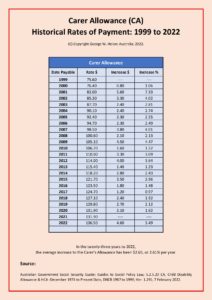
In the 23 years to 2022 the average increase to the Carer’s Allowance has been just $2.65, or 2.61% per year.
The Negative Financial Impacts of Being a Carer!
As at April 2022, Australia’s inflation is at its highest rate in 20 years; the cost of living is skyrocketing; many can’t afford to put nutritious food on the table, and in fact many skip meals altogether; rents have hit the roof forcing many on the street; essential utilities, electricity, gas and rateable services are proving a luxury – having the internet connected is wishful thinking; the cost for support services is spiralling; countless carers and those they care for barely survive with many almost destitute – carers are among the hardest hit!
According to a recent report commissioned by Carers Australia and the National Carer Network ‘Caring Costs Us: The Economic Impact on Lifetime Income and Retirement Savings of Informal Carers (March 2022)’ carers not only forfeit potential lifetime earnings, but miss out on thousands of dollars in superannuation retirement savings.
Carers get no superannuation entitlements.
Carers get no holiday leave entitlements.
Carers often dip into, and deplete their own financial reserves in supporting the person(s) they care for.
When their caring role is at an end, carers under retirement age, or ineligible for a primary income support benefit from Centrelink will often find themselves literally punished and thrown on the Jobseeker scrap-heap; a harsh reality for many older Australians!
Family carers deserve the same respect, recognition and comparable financial remuneration as paid support workers.
FACT: Carers Do Not Receive an Extra Wad of Cash from Centrelink!
Time and time again I have encountered some seriously misinformed and confused people who vehemently believe between a carer and the person being cared for there is a wad of cash called a Carer’s Pension received by a carer in addition to any government primary pension or benefit, e.g. the DSP, or Aged Pension.
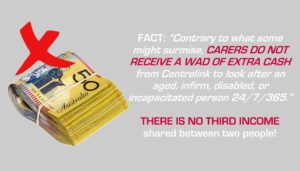
Contrary to what some might surmise, carers do not receive a secondary $987.60 pension each fortnight to look after an aged, infirm, disabled, or incapacitated person 24/7/365.
There is no third income shared between two people; albeit some may qualify for the $136.50 fortnightly Carer’s Allowance.
So let’s set the record straight!
The fact of the matter is Carer’s Pension no longer exists; it was renamed Carer’s Payment in July 1997 and is, by definition, a fortnightly income support payment for people who are unable to support themselves through substantial paid employment due to the demands of their caring role.
Carer’s Allowance came into being on 1 July 1999; it replaced and Combined Child Disability Allowance (CDA) and the Domiciliary Nursing Care Benefit (DNCB) and was paid at the rate of $75.60 per fortnight.
In the twenty-three years to 2022 the average increase to Carer’s Allowance has been $2.65, or 2.61% per year irrespective of increases to workloads, inflation, the cost of living, support services, and to the Carer’s Payment.
By definition Carer’s Allowance is a fortnightly payment that recognises the care provided to a person with disability or medical condition in a private home.
Carer’s Allowance is paid at the rate of $136.50 a fortnight, $68.25 a week, $9.75 a day, or just 41 cents an hour.
Over the decades no government has faced the reality of the sacrifices and price we pay as carers head on, but they’re happy to have us quietly working away in the background for next to nothing, saving them billions of dollars in unpaid care whilst we suffer physically, mentally and financially.
Federal Government Continues to Patronise and Insult Carers!
In December 2021 the federal government announced that caregivers would receive a “boost” to their Carer’s Allowance from January 2022.
Payable only after the first full fortnightly payment cycle after January 1, the “boost” of $4.60 (or 3.49%) a fortnight (or $119.60 a year) is far from adequate; it doesn’t even reasonably cover the significant increases to the cost of groceries, medications, essential living items, utilities and services – doesn’t even buy a loaf of bread!
Touting a paltry increase to the Carer’s Allowance is not something the federal government should be gloating about, it is patronising, shameful and an insult to those who are the backbone of Australia’s aged care and health systems.
The new Carer’s Allowance of $136.50 a fortnight equates to $3549.00 a year, $273.00 a month, $68.25 a week, $9.75 a day, or just 41 cents an hour to look after an aged, infirm, disabled, or incapacitated person 24/7/365.
To add further insult to carers, the average price of Ultra-Premium Unleaded Petrol (UPULP) in late 2021 was $1.75 a litre, now (as at 14 March 2022) it is on average $2.32 a litre – that’s an increase of of 24.57%, or 57 cents a litre.
So now carers have to pluck more money out of a chook’s butt just to keep their car on the road!
The Commitment of Unpaid Carers is Seriously Undervalued!
The commitment, sacrifice and benefit of carers who support and devote themselves to looking after older and vulnerable Australians is by-and-large unrecognised, underestimated and seriously undervalued!
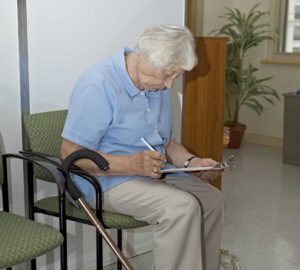
Carers do so much more than just care – they change lives!
Carers are jacks of all trades, masters of none!
Carers afford physical, social, personal, mental, emotional and spiritual support on a daily basis.
Carers should be applauded, appreciated, appropriately financially recognised and respected for their selfless efforts, sacrifices and the noble contribution they make to the community.
Carers don’t just play an integral part in Australia’s aged care and health systems, they underpin them!
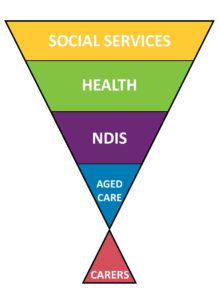
The Australian and State governments should be ashamed of themselves; they could do so much more!
Carers, especially those only in receipt of a Carer’s Allowance, need immediate, realistic and proper financial recognition.
Then there are those government and grant funded service providers who have the gall to charge Australia’s most disadvantaged and vulnerable citizens gap fees for nearly every essential service provided; forcing those that can least afford it to have to prioritise and choose between necessary services.
Government funding and/or grants to support organisations should be conditional on 100% service cost provision with no obligation on clients to make co-payments, pay gap fees or subsidies.
In some cases, what the government gives carers barely covers the costs associated with keeping a car on the road: petrol, insurance, registration, finance, servicing and repairs; usually for the benefit of the person being cared for.
Carers are usually parents, children, siblings, spouses, and friends.
Many carers are on low incomes and find it hard to cover even basic living expenses, let alone having to scrounge around for money to afford essential personal or allied health services, medications, disability aids and to meet the financial burden for increased usage of utility services.
Carers throughout Australia face a significant economic disadvantage with many neglecting their own wellbeing.
Carers themselves often become chronically ill with many suffering from health problems directly linked to their caring role: persistent tiredness, stress, depression, anxiety, back problems or other physical and mental ills.
And just as come carers might abuse their charges, some are themselves subjected to emotional blackmail and coercive manipulation, physical and (often clandestine) emotional, mental and financial abuse at the hands of those being cared for.
For many carers, thoughts of financial ruin, destitution and homelessness are very real!
The increasing plight and suicide rates of distressed carers is continually ignored.
Then there are often siblings who will distance themselves from an aging parent (or parents) and saddle one of their number with the responsibilities of looking after the parent (parents).
“Well, someone has to!”
“We have to work!”
“We have our own responsibilities!”
“You were always the favourite – you do it!”
It’s called inequality in family caregiving when one sibling is expected to carry all, or more responsibility for the provision of a loved one’s care than the other(s).
Some siblings don’t even consider offering a parent carer a break, time alone, time away, an ear to unload, the benefit of company, the opportunity for respite and relief.
Siblings often become distant and make excuses not to visit, save there might be a request for help or assistance to do something.
“Out of sight – out of mind,” goes the old saying.
Much of what carers do goes unnoticed, unrequited, unrewarded.
Could you do it?
The Precepts of Being a Carer!
Have you ever thought about what carers do, their responsibilities and the issues they face each and every day?
The next time you’re about town and see a carer, why not stop, think and wonder for a few moments what that person might be going through; why that person is the way they are and what that person has committed his or her life to; what sacrifices that person is making to care for another – a parent, family member or a friend?
Could you commit to, and honour the precepts of being a carer?
A CARER COMMITS to being there and making oneself available 24/7/365: 24 hours a day, 7 days a week, 365 days in the year for the benefit of the person being carer for.
A CARER IS RESPONSIBLE for affording continued personal company, emotional, physical and spiritual support so as to ensure the safety, wellbeing and good health of the person being cared for.
A CARER PROVIDES security, comfort, encouragement and reassurance so as to ensure a continued quality of life and independence of the person being cared for.
A CARER MAKES the person being cared for his/her priority, often ignoring and neglecting their own physical and mental health, personal well-being and circumstances.
A CARER ADVOCATES to secure and defend the rights, needs and entitlements of the person being cared for.
A CARER GIVES UP his/her own time willingly, or regardless, to cater to, and meet the priorities and needs of the person being cared for.
A CARER OFTEN puts his/her own desires, wants, interests, needs and health to one side in order to meet the needs of the person being cared for.
A CARER TAKES ON additional household duties and basic chores including: shopping; bill-paying and banking; mail despatch; the completion of form-filling, paperwork and correspondence, and medication dispensary, etc.
A CARER UNDERSTANDS that the person being cared for will be desirous to attend to personal shopping matters from time-to-time and will need transport to get, and assistance to be there.
A CARER UNDERTAKES to, organises and sometimes carries out maintenance around the home.
A CARER GIVES personal, business, and health advice unreservedly so as to promote the independence, personal safety, active health, wellbeing, and community interaction by, and of the person being carer for.
A CARER LIAISES with all third parties – and intervenes accordingly – to ensure that any bothersome financial, health, or other administrative matters are addressed and resolved in a timely manner to the satisfaction of the person being cared for.
A CARER TAKES ON the responsibility of seeking out and ensuring that medical care and assistance can not only be obtained, but attended to, and delivered in a timely manner.
A CARER ENSURES that the person being cared for is taken to all medical appointments and for diagnostic tests in a timely manner.
A CARER UNDERTAKES to ensure that a means of transport is available at all times by committing and undertaking to provide an accessible, ready, and reliable mode of passage as required.
A CARER RECOGNIZES and appreciates that the person being cared for can have unique mobility issues and undertakes to assist the person being cared for in any way possible by providing the means to access and utilise available mobility assistance devices so that he, or she can retain a certain level of independence.
A CARER ENDEAVOURS to preserve consistency and familiarity of life for that person being cared for by ensuring that there is minimal disruption to routines, disturbances in surroundings and upheavals in the life of his or her charge.
A CARER ACCEPTS that unexpected situations may arise where contingency plans will need to take priority over all else so as to ensure that the rights and interests of the person being cared for are vigorously defended.
……
And as the sun sets, the carer’s day and opportunity to do something for self are gone.
About Me?
I am a fulltime 24/7/365 carer of an aged, infirm and ill parent diagnosed with Lewy Body Dementia (LBD).
As well being an abuse victim survivor campaigner, I am a patient, mentor, counsellor and advocate for those with rare diseases and genetic disorders, and a proponent for aged care and carers.
Revisions:
Article originally published 19 September 2021. Revised: 14 March 2025; 30 November 2023; 16 January 2023; July 2022; June 2022; May 2022; April 2022; March 2022; February 2022; January 2022; December 2021; October 2021.

